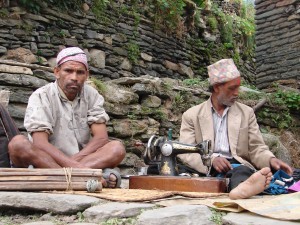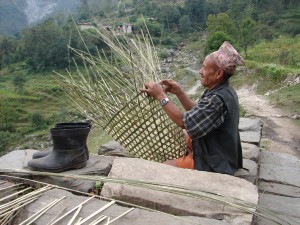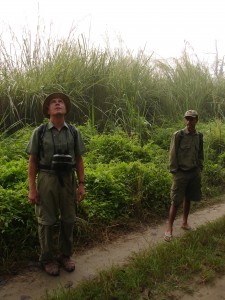How do you start up a business if you live in a village? Of course it depends on a lot of things. But consider the basics for a moment. Indeed, it’s also hard to be a successful businessman in the city. Living in an urban community does give you certain advantages, like a fairly big market in the shape of lots of people, as well as, say, better infrastructure and easier access to information, even faster internet connection and mobile phone networks. Yet, in the city, getting the “business idea” and making it materialise can be really hard too. However, if you look at a village community, multiply that a couple of times! It is so much harder off the main roads, far away from banks and suppliers, and sometimes even without a proper phone connection. There is also the problem of a much smaller market: who are you going to sell to in a village, and will villagers be interested in any new goods? It’s tempting to give up in the face of all these difficulties, isn’t it? Well, many do. But some try to start up a local business anyway and some are able to make it successful!
We have met several local entrepreneurs who have created quite successful local businesses. They not only got the ideas out in the villages but turned them into reality out there as well. Take one guy, Jib, who still runs a wild-life hostel down in a village in Chitwan. Many tourists come and stay there – tourists from abroad, at that – and this has impressed many visitors, ourselves included. We’ll get back to his story shortly. Who else have we met who started up successful local businesses? Indeed, go to any village, and you’ll always find some in the “traditional” sectors: the grocery shop, the stationary shop, or the vegetable stand; the teashop, the restaurant, sometimes a guesthouse; the bike mechanic or the blacksmith; the carpenter, perhaps a shoe-maker, the rice mill-owner, occasionally a local contractor and a few more. In fact, that’s often what the local business sector amounts to in a village community. Even the local market is typically quite restricted: in many villages you can’t really make people buy much else than what they do already. But there are also those entrepreneurs who explore new opportunities, and some of them are successful, too!
Who are those “business entrepreneurs”? Well, they are quite often energetic individuals who set out to try something new, typically by entering markets beyond their immediate village community: markets in the district town, in Kathmandu, and even abroad. Indeed, it can go wrong – it’s always risky to explore new ideas – but let’s take an example of a successful initiative. One guy who made it is N. Shrestha who began making a sizeable extra income some years back right at his home. We stumbled into him in his village where several households were in fact involved in the same business as he was: dried lapsy production. They were boiling lapsy – a prune-like fruit known to every Nepali kid – making it into a paste which they then spread to dry. The dried produce was sold to vendors in the capital, and Shrestha did that too. But along with his cousin, he had taken the business a big step further. He not only dried the fruit but also processed it on the spot, using a simple technology picked up from a TV show, turning it into real sugar-coated candy. He even packaged it for the shelves. In that way, Shrestha was able to export to customers with a sweet tooth as far away as Bangladesh. Or consider another guy who offers a different example of a local business entrepreneur with a successful idea: he had started to mould cement elements in his backyard, now supplying house-builders in two districts!
We have often been impressed, even excited, at meeting such successful businessmen in the otherwise “traditional” business environment in many villages. But instead of adding more examples, let’s now take Jib, the guy with the hostel in Chitwan, just to illustrate how businesses can start – and in the most unlikely ways. Indeed, there are many remarkable examples out there once you start looking at local entrepreneurship. But perhaps what astounded us in Jib’s case was the way he managed in his early youth to get out of a very difficult situation by making a local business and a quite unusual one at that. As a teenager, he had to suffer the same fate as so many other boys and girls in Nepal: he flunked the SLC exam. It was not just the humiliation but also that it closed so many doors. What now about further studies, well-paid jobs, marrying a girl from a good family – all seemed a lost dream! So, what did Jib do? Well, the first couple of months he secluded himself, hiking into the nearby Chitwan jungle reserve every morning and coming back only at night, if he didn’t sleep over with the fishermen on the river bank. Was it an escape into the wild? Only at first.
The jungle trips then turned into something more! Jib started to hang out with the elephant drivers and tour guides at the famous Tiger Tops five star resort inside the jungle, and from them he learned something new. He learned about the wild and its inhabitants: the animals. It wasn’t just birds – it was also rhinos, tigers, and the Chital deer, to mention just a few, and all of these were added to his soon growing knowledge of this amazing jungle reserve. The way Jib recalls it, he got absolutely blown away by nature, and that experience became the beginning of the path which now opened up in front of him. He simply decided to make a wildlife resort of his own! Well, it wasn’t to be located inside the jungle. But, on a piece of land on the outskirt of his village, he built a small hut, and later his business came to grow both in terms of its size and reputation. Indeed, go to the VDC of Meghauli in Chitwan, ask for the “Chital Lodge”, and you’ll drive right into his resort, tugged away between a cluster of tall old trees next to a clear-water stream. Under the dense canopy, Jib offers visitors a handful of cosy thatched huts as accommodation for the night, in a homie kitchen: Nepali cuisine, and on top of that guided wildlife tours deep into the jungle. A group of English birdwatchers who stayed there even rated it higher than Tiger Tops itself what guided trips are concerned!
Local business entrepreneurs can be impressive, we at least think – like Jib. Here was a local guy who flunked SLC but ended up beating a five-star resort in the eyes of visitors from a British bird-watching society! That kind of success story would beg another question, wouldn’t it, especially if you’re a young guy who wants to start up a local business, or if you want to improve conditions for local business entrepreneurs: how is it possible to make a successful innovative business out in the villages? We will give you the whole story on Jib’s experience as soon as we get down there again to visit him, in a few months we hope. In fact, we are planning to make this an ongoing theme here on Local Nepal Today: How have locals started up and expanded their local businesses? Indeed, if you’re a local entrepreneur, or if you know someone who is, please share your story too: maybe others can learn from your experience! Even if it didn’t turn out well – it is hard to make a successful local business – what better way to promote business initiative, then, than to tell folks about it. We feel it would be fruitful to get the positive stories out there as well as lessons learned the hard way, even if it’s “just” about a small candy shop or a business like Chital Lodge. Do drop us a message and we’ll contact you, or write a full-fledged story. In the meantime, we’ll get back to Jib and others and collect theirs. Stay tuned!






1 comment
thanks sir you are recocnise me